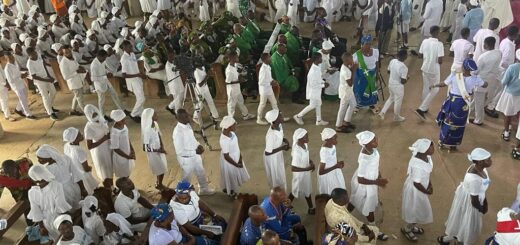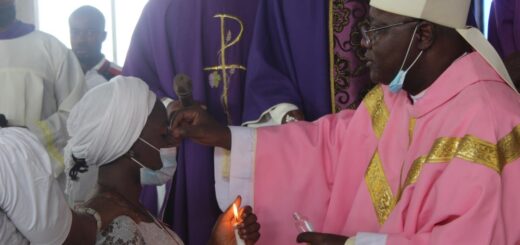The Inclusive Scope of God’s Saving Plan
by ARCH BISHOP · August 16, 2020
20th Sunday, Homily by Archbishop I. A. Kaigama at St. John the Baptist Parish, Mpape, Abuja, August 16 2020.
Readings: Is 56:1, 6-7; Rom 11:13-15, 29-32; Mt 15:21-28
But for Jesus who united us and made humanity without borders possible, we would not have been able to gather in harmony like this, coming from different cultures and ethnic backgrounds. In our history of relationship without Christ, there had always been hostility, distrust and a feeling of superiority complex among different tribes and clans. Christianity has reduced this tendency, but the hangover is still very strong. This explains why in many of our countries artificial ethnic and religious barriers remain serious threats to sincere brotherhood and sisterhood, and even national progress.
In their history, the Israelites were prevented from any contact with foreigners so as not to be drawn to worshiping any god other than Yahweh (cf. Deut. 7:2-5). This led to the exclusion of foreigners from praying and offering sacrifices in the Temple. Today’s readings reveal the expansive and universal nature of the kingdom of God and the inclusive scope of God’s saving plan. No doubt, the Israelites were a favoured people as God’s chosen race, however, God included all nations, and blessed all the families of the earth in Abraham (cf. Gen 12:3). The Israelites misconstrued their privileged position from God, believing they were the sole beneficiaries of God’s love to the exclusion of other nations, labelling them Gentiles or sinners. God’s saving love, in modern parlance, is “democratic”. It is available to all those who love Him and keep His commandments.
The background to the first reading from the prophet Isaiah was the return from the Babylonian exile. Some Jews after the exile had ended chose to remain in Babylon and some married to non Jews, something considered by the Jews as abominable. Prophet Isaiah declared that God was interested in the people of other nations too. His house is a “house of prayer for all peoples” (Is 56:7). The psalmist expresses this, “Let the peoples praise you, O God; let all the peoples praise you” (Ps 67:5).
By virtue of our baptism, we all belong to one another as brothers and sisters in Christ, with a faith that welcomes everyone as Jesus does without barriers or discrimination. No one is a stranger. We belong to Jesus and to one another as “there is neither Jew nor Greek, neither slave nor free, neither male nor female” (cf. Gal 3:28).
The Canaanite woman in our Gospel text today was able to break the barrier and wall of division that stood tall at that time, between Jews and non-Jews. The Jews considered the Canaanites as ritually unclean. But this Canaanite woman put her faith in the Lord, and without fear asked for help, trusting in the healing power of Jesus.
By Jesus healing her daughter tormented by a demon, He broke the chains of generational hostility and promoted respect for the female gender. Jesus first ignored the woman’s request, telling her, “I was sent only to the lost sheep of the house of Israel” (Mt 15:24). The woman, who should have gone away sad and disappointed remained persistent in her request.
Her strong and enduring faith in Jesus was remarkable. She showed great humility in approaching Jesus in spite of the prevailing cultural barriers, and displayed great perseverance even when Jesus tested her endurance. Sometimes, our unanswered prayers for ourselves, families, communities and nation can serve as a test of faith. The experience of the Canaanite woman testifies that God can choose to either grant our requests instantly or delay it; but His delays are not denials. We need to have a “stubborn” faith like the Canaanite woman, confidently trusting that Jesus can do it for us when everything seems impossible.
Lessons to learn today:
• We should have a persevering faith even when answers to our prayers are not forthcoming.
• We should correct our negative attitude towards those we regard as strangers, foreigners or outcasts.
• We must pull down the terrible walls of division and segregation, knowing that the Church belongs to the whole human race.
• We must be “another Christ” to those we meet no matter how radically different they may be from us.
• When we feel unhappy or offended by something in the Church, imitate the Canaanite woman’s resilient faith who did not angrily turn and walk away when the expression “dog” was used figuratively by Jesus.
• We must see Christ in the poor and vulnerable, the marginalized, the uneducated; those with disability, refugees and migrants.
• We must build stronger walls of mercy and love and realize as Nostra Aetate no. 1 says, “All human beings belong to the same race and have the same origin and destiny”.
Dear Brothers and Sisters, whether we are Tiv, Igbo, Gbagyi, Idoma, Yoruba, Urobo, Berom, Baju, Jukun, Igala or Fulani, let us embrace one another sincerely in love. I am sure this is the desire of your Parish priest, Fr. Hilary Ugiomoh and his associate Fr. Moses Akuhwa, the Parish Pastoral Council and indeed the parishioners of St. John the Baptist Mpape. Please, irrespective of tribe, language or social status, remain one family and continue to celebrate your cultural gifts. I look forward to your inter-cultural day celebration.
God bless and keep you.




